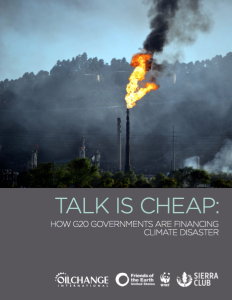Die G20 haben bereits vor Jahren versprochen, aus der Subventionierung von fossilen Energien auszusteigen. Mit der Umsetzung hapert es allerdings. Das zeigt auch diese interaktive Karte.
Ein neuer Bericht von Oil Change International, Friends of the Earth – U.S., Sierra Club und dem WWF European Policy Office (Talk is Cheap – How the G20 are financing climate disaster) kommt nun zum Schluss, dass die G20 immer noch mehr als vier Mal so viel öffentliche Gelder in fossile Energien stecken wie in erneuerbare Energien!
Weitere Schlussfolgerungen aus dem Bericht:
Of all public finance for energy from G20 institutions and the multilateral development banks between 2013 and 2015:
- Half – 50 percent – supported oil and gas production ($62 billion annually).
- Looking at all fossil fuel finance, G20 public finance institutions and the multilateral development banks together supplied over 6 times more finance to oil and gas than to coal.
- G20 public finance for fossil fuel exploration – exploration for new reserves of oil, gas, and coal – averaged $13.5 billion annually. This finance is particularly egregious, given that most already-discovered reserves must remain unburned to avoid the worst impacts of climate change.
- G20 export credit agencies provided considerably higher levels of support to fossil fuel production between 2013 and 2015 ($38.3 billion annually) relative to all other sources of G20 bilateral public finance for fossil fuels between 2013 and 2015 ($24.7 billion annually). On top of this, multilateral development banks such as the World Bank provided $8.7 billion annually in fossil fuel finance over this same period.
- Among G20 export credit agencies, support for oil and gas is nearly 6 times as large as support for coal, while among multilateral development banks, support for oil and gas is more than 12 times as large as support for coal.
Mehr Hintergründe zur Energiepolitik der G20 geben Elizabeth Bast und Alex Doukas in diesem Beitrag für die Heinrich-Böll-Stiftung.
